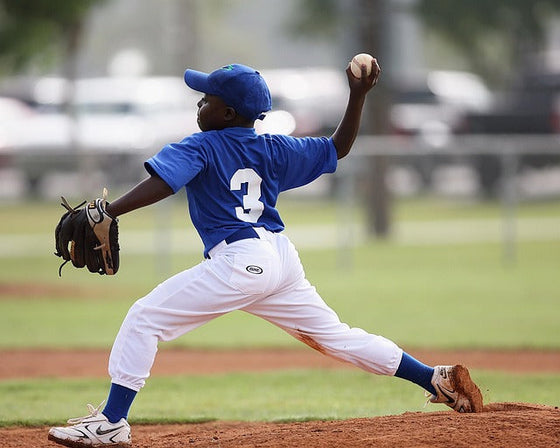by Bobby Woods February 03, 2025

Baseball is often called America’s pastime, and for good reason. The game offers countless life lessons, such as teamwork, discipline, and resilience. One of the most important aspects of youth baseball, however, is building confidence in young players. Confidence is critical for success on the field—it influences how athletes approach challenges, bounce back from mistakes, and push through adversity. As coaches and parents, helping young players develop confidence is essential to their growth as both athletes and individuals.
This article will explore effective mental and physical techniques for building confidence in young baseball players, including how incorporating baseball videos into training and development can inspire, educate, and boost self-assurance both on and off the field.
Baseball is a unique sport in that it requires players to deal with failure more than success. A batter who gets on base three out of every ten at-bats is considered an excellent hitter. Similarly, pitchers can give up multiple home runs and still win the game if they show resilience and maintain composure. For youth players, learning how to handle failure and bounce back is crucial—and that starts with building confidence.
A confident player is more likely to:
As a result, a player who develops solid confidence at a young age can grow into a strong and resilient athlete, with the mental fortitude to navigate the ups and downs of baseball.
Building confidence is as much about mental strategies as it is about physical abilities. Below are some effective mental techniques that can help young baseball players build their self-assurance.
Confidence is often the result of achieving goals, whether small or large. Setting clear, realistic goals provides young players with a sense of purpose and direction. These goals can be performance-based (e.g., improving batting average, learning a new pitching technique) or process-based (e.g., focusing on the fundamentals of a swing, improving throwing mechanics).
Once goals are set, tracking progress regularly can be a major confidence booster. Watching improvement over time reminds players of their growth and reinforces the belief that hard work leads to success. A great way to help players track progress is by encouraging them to keep a journal or log, noting both successes and areas for improvement after each practice or game. Positive reinforcement goes a long way in boosting self-esteem and nurturing confidence.
Visualization is a powerful tool for athletes of all ages. By using mental rehearsal, players can imagine themselves succeeding in different game situations. Whether it’s hitting a fastball or fielding a tough grounder, visualization allows players to mentally practice skills and scenarios. This technique prepares the mind for the game, fostering a sense of readiness and confidence.
Coaches and parents can encourage visualization by guiding young players through exercises where they close their eyes and vividly picture themselves succeeding on the field. They should imagine the sights, sounds, and even the emotions they’d experience during a successful play. Practicing this regularly helps build a mental picture of success, making players more confident when the situation arises.

Negative self-talk is one of the biggest obstacles to building confidence. Young players often struggle with negative thoughts, especially after making mistakes. Phrases like "I can't do this," "I'm terrible," or "I'll never get it" can significantly hinder progress and erode self-esteem.
Encouraging players to adopt positive self-talk can help combat these negative thoughts. Teach them to replace self-defeating thoughts with empowering ones, such as "I am getting better every day," "I can learn from this," or "I have the skills to succeed." The more players practice reframing negative thoughts, the more they will internalize their potential for success, boosting their confidence both on and off the field.
Failure is inevitable in baseball, and it’s essential for young players to learn how to bounce back from mistakes. A key aspect of building confidence is reframing failure as an opportunity for growth. Every missed swing, botched catch, or strikeout is a chance to learn something new and improve.
Instead of focusing on the negative emotions tied to failure, coaches and parents should help players analyze what went wrong and what they can do differently next time. By viewing setbacks as temporary obstacles rather than insurmountable challenges, players learn to maintain a positive mindset, which strengthens their overall confidence.
While mental techniques are important, physical preparation and skill development also play a crucial role in boosting confidence. When young players feel capable of executing fundamental skills, their confidence naturally increases. Below are a few physical techniques that can help players build their confidence.
No matter the skill level, mastering the basic fundamentals of baseball is key to building confidence. Players who feel in control of basic skills—whether it's hitting, throwing, or fielding—are more confident in their ability to handle complex situations. Regular practice of the fundamentals builds muscle memory and ensures that players are prepared for game situations.
Coaches should ensure that young players understand the importance of repetitive drills. The more players practice basic skills, the more confident they will become in their abilities. Over time, players can progress to more advanced techniques, but building a solid foundation in the basics is always the first step.
Confidence grows through small victories. Coaches can help players gain confidence by breaking down tasks and celebrating even minor successes. For example, if a player struggles with batting, focusing on hitting a line drive off a tee first can give them a sense of achievement. Once that’s mastered, moving to live pitching will feel like a natural progression. Reaching these small milestones along the way makes players feel like they are making tangible progress, which boosts their overall confidence.
Physical conditioning is also a key part of building confidence in baseball. Players who feel physically fit are more likely to approach the game with confidence because they know they are capable of handling the demands of the sport. Strength training, agility drills, and endurance exercises not only enhance athletic performance but also help players feel stronger, faster, and more capable on the field.
Working with a trainer or coach to incorporate fitness into a player’s training routine can have a profound impact on their self-confidence. When players see tangible improvements in their physical fitness, they will feel more self-assured during competition.
Constructive feedback is one of the most powerful tools for building a player’s confidence. Rather than focusing solely on what went wrong, it’s important for coaches to emphasize what the player did well and provide actionable suggestions for improvement. Positive reinforcement helps players recognize their strengths, which in turn builds their confidence.
For instance, instead of simply criticizing a batter for striking out, a coach might say, "You did a great job seeing the ball, but let’s work on adjusting your stance for better timing next time." This balanced approach fosters confidence and encourages players to stay engaged in their development.
Building confidence in young baseball players is essential for their success both on and off the field. By employing a combination of mental techniques, such as goal setting, visualization, and positive self-talk, along with physical strategies like mastering the basics and focusing on fitness, players can develop the self-assurance they need to perform at their best. As parents, coaches, and mentors, it’s our job to guide these young athletes, teach them how to handle setbacks, and celebrate their progress along the way. When confidence is cultivated early in a player’s career, it paves the way for a lifelong love of the game, personal growth, and success both on and off the diamond.
Comments will be approved before showing up.

by Bobby Woods November 26, 2025

by Bobby Woods June 10, 2025

by Bobby Woods April 22, 2025
Sign up to get the latest on sales, new releases and more …

Bobby Woods
Author